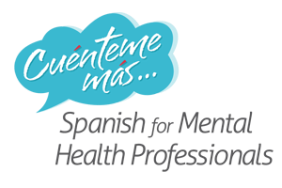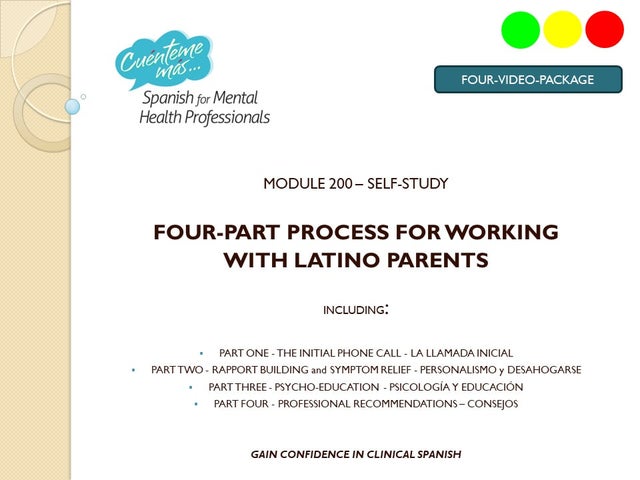- SCHOOL BASED THERAPISTS
- >
- 200 - SELF-STUDY, NON CE: FOUR PART PROCESS FOR WORKING WITH LATINO PARENTS
200 - SELF-STUDY, NON CE: FOUR PART PROCESS FOR WORKING WITH LATINO PARENTS
This module is suitable for Mental Health Professionals with Intermediate to Advanced Spanish. This simple four part process will help you feel confident when you implement these practical interventions with the Spanish speaking parents of your young clients.
Part One: La Llamada Inicial - The Initial Phone Call
Beginning to Advanced
Time 17:04
Become more confident making that first phone call to your client's parent to arrange for a consultation. Learn vocabulary and phrases for three types of situations: therapist leaves a message on recorder, therapist speaks to someone other than the client, therapist speaks to client directly.
Part Two: Personalismo y Desahogarse - Rapport Building and Symptom Relief
Advanced Beginner and Up
Time: 16:46
This module covers the understanding and implementation of cultural constructs Desahogarse and Personalismo in the initial session. Included in this module is rapport building, provide symptom relief, gather a history, formulate diagnostic impressions, psycho-education.
Part Three: Psycho-Education and Consejos with Parents
Advanced Beginner and Up
Time: 16:35
In this module you will learn a model for explaining things and providing advice to the parent of your child client. This is helpful when you need to explain something, and then give a piece of advice or direction. For example, if you need to tell your client about a diagnosis such as, "Your child is suffering from Reactive Attachment Disorder." The module provides examples of ways to explain different things that may be going on, and general therapist statements to help the parent improve understanding and coping skills.
Part Four: Consejos - Advice and Recommendations
Advanced Beginner and Up
Time: 14:55
This module covers using the imperative tense to give a variety of professional recommendations to a parent. The construct of Consejos in Latin America suggests that clients often expect a mental health professional to provide concrete and useful advice in order to feel that the therapist and therapeutic process are trustworthy.





